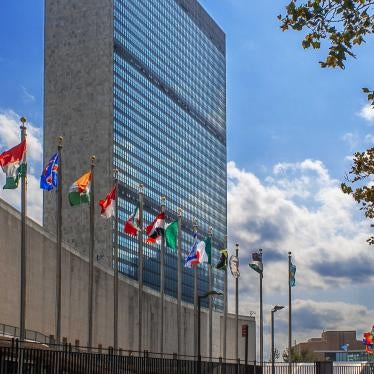(Beirut) – Egyptian security forces forcibly disappeared a man after the unscheduled landing of his flight in Luxor, Human Rights Watch said today. The authorities should immediately reveal his whereabouts and the legal basis for his arrest.
On January 12, 2022, Hossam Menoufy Mahmoud Sallam, 29, an Egyptian national, was traveling on a direct flight from Khartoum to Istanbul when the plane made an unscheduled landing at the Luxor International Airport, friends and family of Menoufy told Human Rights Watch. After all passengers disembarked to the transit lounge, security officers summoned Menoufy and checked his passport and travel documents. He was last seen by witnesses in the custody of Egyptian officials.
“The Egyptian government should immediately disclose Hossam Menoufy’s whereabouts and allow his lawyer and family to see him,” said Joe Stork, deputy Middle East director at Human Rights Watch. “Forcibly disappearing him is a serious crime.”
Egyptian authorities refused to respond to questions about his whereabouts. But Egypt’s Interior Ministry said in a January 15 statement that “Hossam Menoufy is imprisoned in the case in which he is accused, pending investigations.”
Egyptian security forces in recent years have disappeared hundreds of people, who have reappeared after weeks, months, or sometimes years before they are charged or released. Egyptian security agencies have carried out arbitrary arrests, enforced disappearances, and torture against perceived dissidents, including many alleged members or sympathizers of the Muslim Brotherhood.
Menoufy moved to Sudan from Egypt in 2016 out of fear of government persecution. A friend told Human Rights Watch that he had been a supporter of the Muslim Brotherhood, which the government designated a terrorist organization in 2013.
The unscheduled landing in Luxor of the Badr Airlines plane was reportedly triggered by a defective smoke alarm, the airline said in a statement. After passengers disembarked, Egyptian security summoned three Egyptian passengers, including Menoufy, to check their passports and travel documents.
Witnesses told Menoufy family that Menoufy did not return to the transit area with the other two Egyptians. Security officials made Hossam sign a document stating that he had entered Egyptian soil on his own free will, said his friend, who said that Menoufy had contacted him before he was arrested. When a replacement plane left for Istanbul a few hours later, Menoufy had not reboarded.
Menoufy has not been seen by those looking for him at any prison or detention center since January 12. Menoufy’s lawyer told Human Rights Watch that, “until now, we have not heard anything [more] about Hossam. They have not released any information about the case.”
Before Menoufy was allowed to board Badr Airlines flight J4690 in Khartoum, Sudanese passport officers stopped and questioned him for about an hour at the Khartoum International Airport, friends and family said. Two of Menoufy’s friends said that Menoufy heard from Sudanese contacts about five months ago that the Egyptian government had asked the Sudanese government to send him back to Egypt.
A Badr Airlines statement said that “an alarm was issued from the [flight J4690] smoke detection system in the cargo cabin, room no. (1), and as a routine measure required by aviation regulations and laws, the flight landed at the nearest airport.” The airline said that the alarm was triggered by “a false signal from the detection system.” Another plane was sent to complete the flight to Istanbul.
Badr Airlines said that the need to have the passengers board a new plane made “the Egyptian authorities part of the travel procedures” and “this is what led to the arrest of the aforementioned passenger.”
The Turkey-based human rights organization We Record stated that passengers on the plane said that they had heard no alarm in the passenger cabin. Aviation experts told Human Rights Watch that the type of alarm described would most likely alert only pilots in the cockpit.
Egyptian state media claimed that Menoufy was a founder and prominent member of the Hasm armed group and that security forces accuse him of involvement in several bombings and assassinations. In March 2020, Menoufy was sentenced in absentia to 25 years in a mass military court trial in connection with case 64 of 2017, which refers to the attempted assassination of the assistant prosecutor general, Zakaria Abdul Aziz, in September 2016, and other charges. The Egyptian Front for Human Rights documented extensive fair trial and due process violations in the trial.
Menoufy’s family and friends deny allegations that he was involved with Hasm. They say he was a known supporter of the Muslim Brotherhood. A friend said that he objected to the Hasm movement and never communicated with its members.
Menoufy previously traveled to Istanbul from Khartoum without incident in September 2020.
In March 2021, after a popular uprising had driven Sudanese President Omar al-Bashir from power in 2019, Sudan and Egypt signed a military cooperation agreement. In August, the official Sudan News Agency reported that the “Sudanese police sent 105 officers to receive advanced training in Egypt.”
In September, the Biden administration withheld US$130 million in Foreign Military Financing for Egypt pending the Egyptian government satisfying human rights conditions by January 30, 2022. France is also a major weapons provider for Egypt and became the country’s main arms supplier between 2013 and 2017.
“Enforced disappearances and torture have run rampant under this Egyptian government,” Stork said. “Hossam Menoufy’s disappearance is another reason, if one was needed, why Egypt’s allies in Washington and European capitals should halt all military and security assistance to Egypt.”









